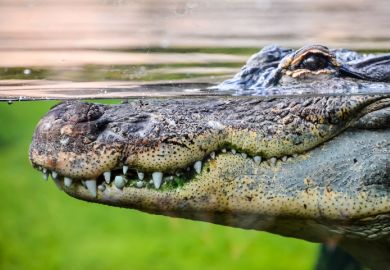The Czech Republic’s most famous university is facing calls to block the appointment of its new dean of social sciences after it emerged that she has published in alleged junk journals.
The controversy follows the decision by the academic senate of Charles University in Prague, which was founded in 1348, to select Alice Němcová Tejkalová as head of its Faculty of Social Sciences.
More than 330 academics from across the world have added their names to an open letter calling on the university’s rector, Tomáš Zima, to veto the committee’s decision over several questionable publications.
The letter claims that “in the recent past Dr Němcová Tejkalová authored several articles in fraudulent journals” that “[lacked] standard peer-review processes” and “failed to meet basic scholarly standards”.
“The resulting articles are far below the essential requirements for scholarly texts in the author’s field of study and are a disgrace to research conducted at such a prestigious institution as Charles University,” it adds, stating that Dr Němcová Tejkalová’s behaviour was “incompatible with her holding any senior position in academia, let alone directing the Faculty of Social Sciences, an acclaimed hub of social science research in the region”.
“Having a dean with the record of multiple fraudulent publications would testify to a post-truth state at Charles University, imperilling its authority as a public institution that produces knowledge based on rigorous methods and that adheres to high standards of critical inquiry,” the letter claims.
Two of Dr Němcová Tejkalová’s publications have appeared in journals that featured on the list of predatory journals run, until recently, by Jeffrey Beall, a University of Colorado librarian and authority on bogus journals, the signatories state.
One of these is an article, titled “Media Coverage of the Summer Paralympic Games (1992-2008)”, which was printed in the Mediterranean Journal of Social Sciences in 2015, an annex to the letter explains. This journal covered an “unusually broad array of subjects”, including Mediterranean and world culture, sociology, linguistics, anthropology and economics – a hallmark of a predatory journal, the letter says. In addition, the journal put out 16 editions in 2016 and eight in 2017 – including one with 66 articles, which is another sign of a questionable publication, it adds.
Several other of her articles appeared in journals not on Beall’s list that, nonetheless, showed clear signs of being junk journals, the letter says.
“Whether a result of deliberate calculation or mere ignorance on her part, Dr Němcová Tejkalová has demonstrated that she has either not been aware of or has chosen not to adhere to ethical standards of scholarly work,” the letter concludes.
However, Professor Zima has rejected the calls to intervene. In a response to the letter, he says that none of the research papers raised had “breached research ethics [and] therefore, I do not have grounds to intervene in any manner”.
“I should point out that Beall’s List is just an auxiliary indicator and the mere fact that someone has published a paper in a journal listed therein is not automatic evidence of unethical conduct,” writes Professor Zima, who adds that he would “honour the resolution and will of the academic senate”, which had known about the allegations when it made its choice.
However, one of the letter’s signatories, Anna Durnová, a social scientist at Vienna’s Institute for Advanced Studies, urged Professor Zima to reconsider the appointment, which will be ratified in early 2018.
“There are rules of scientific integrity that apply to all of us, regardless of country or academic discipline,” said Dr Durnová, who added that these rules “must never be relativised or even disregarded”.
“Academics can make mistakes, but they should be held accountable and not obtain high academic leadership roles,” she concluded.
Register to continue
Why register?
- Registration is free and only takes a moment
- Once registered, you can read 3 articles a month
- Sign up for our newsletter
Subscribe
Or subscribe for unlimited access to:
- Unlimited access to news, views, insights & reviews
- Digital editions
- Digital access to THE’s university and college rankings analysis
Already registered or a current subscriber?








